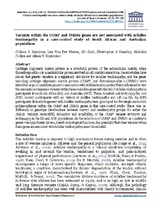| dc.contributor.author | Saunders, Colleen J. | |
| dc.contributor.author | Van Der Merwe, Lize | |
| dc.contributor.author | Cook, Jill | |
| dc.contributor.author | Handley, Christopher J. | |
| dc.contributor.author | Collins, Malcolm | |
| dc.contributor.author | September, Alison V. | |
| dc.date.accessioned | 2018-01-26T12:23:58Z | |
| dc.date.available | 2018-01-26T12:23:58Z | |
| dc.date.issued | 2013 | |
| dc.identifier.citation | Saunders, C.J. et al. (2014). Variants within the COMP and THBS2 genes are not associated with Achilles tendinopathy in a case-control study of South African and Australian populations, Journal of Sports Sciences, 32(1): 92-100 | en_US |
| dc.identifier.issn | 0264-0414 | |
| dc.identifier.uri | http://dx.doi.org/10.1080/02640414.2013.807351 | |
| dc.identifier.uri | http://hdl.handle.net/10566/3424 | |
| dc.description.abstract | Cartilage oligomeric matrix protein is a structural protein of the extracellular matrix, while thrombospondin-2 is a matricellular protein involved in cell–matrix interactions. Recent studies have shown that genetic variation is a significant risk factor for Achilles tendinopathy, and the genes encoding cartilage oligomeric matrix protein (COMP) and thrombospondin-2 (THBS2) were identified as good candidate genes for association with Achilles tendinopathy. This study aimed to test the association of sequence variants within these candidate genes with the risk of Achilles tendinopathy in participants from South Africa (SA) and Australia (AUS). Three-hundred and forty (133 SA; 207 AUS) control participants with no history of Achilles tendinopathy and 178 (94 SA; 84 AUS) participants clinically diagnosed with Achilles tendinopathy were genotyped for five single nucleotide polymorphisms within the COMP and THBS2 genes in this case-control study. There was no difference in genotype distributions between control and tendinopathy groups for either the THBS2 variants rs9505888, rs6422747 and rs9283850, or the COMP variants rs730079 and rs28494505 in the SA and AUS populations. As the selection of COMP and THBS2 as candidate genes was hypothesis driven, based on biological function, the possibility that other variants within these genes are associated with Achilles tendinopathy cannot be excluded. | en_US |
| dc.language.iso | en | en_US |
| dc.publisher | Taylor & Francis | en_US |
| dc.rights | This is the author-version of the article published online at: http://dx.doi.org/10.1080/02640414.2013.807351 | |
| dc.subject | Achilles tendon | en_US |
| dc.subject | Genetic association studies | en_US |
| dc.subject | Tendinopathy | en_US |
| dc.subject | TSP-5 | en_US |
| dc.subject | Thrombospondins | en_US |
| dc.title | Variants within the COMP and THBS2 genes are not associated with Achilles tendinopathy in a case-control study of South African and Australian populations | en_US |
| dc.type | Article | en_US |
| dc.privacy.showsubmitter | FALSE | |
| dc.status.ispeerreviewed | TRUE | |
| dc.description.accreditation | Web of Science | |

